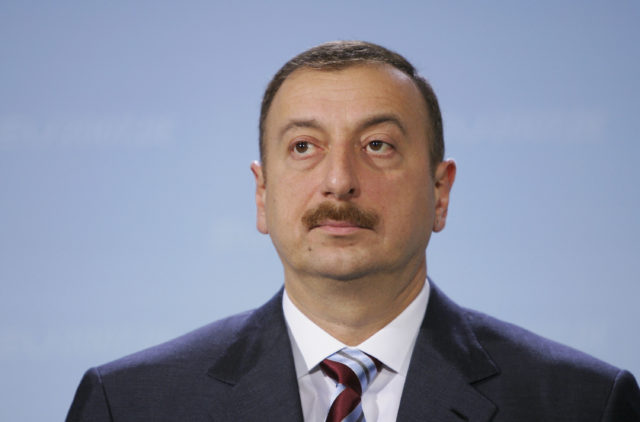
Russian Overreach Calls Into Question Baku’s Balanced Foreign Policy
Publication: Eurasia Daily Monitor Volume: 14 Issue: 157
By:

Like his father Heydar Aliyev before him, Azerbaijani President Ilham Aliyev remains committed to a balanced foreign policy, one that seeks to maintain good relations with both the Russian Federation and the West. But a series of Russian actions that Baku views as hostile have called that approach into question, leading to a dramatic cooling off in bilateral ties and potentially re-ordering the geopolitics of the South Caucasus—or possibly even more than that.
In late November, the Azerbaijani government told Russia that it would not accept the latter’s proposed new ambassador, putting the two countries “on the edge of a diplomatic scandal,” according to a Russian news agency (Regnum, November 28). That may have surprised some in the West, but it should not have come as one to those who had been paying close attention. Indeed, the latest spat reflects Moscow’s increasingly Soviet-style in its diplomatic relations with the former Soviet republics. Moreover, it follows a series of progressively more offensive Russian actions, at least from Baku’s point of view.
During the Cold War, Moscow often dispatched ambassadors to its satellites in Eastern Europe without the niceties of the agrément process that governs diplomatic relations between most states. That is, the Soviet capital announced an ambassador without checking with or obtaining the approval of the country to which Moscow’s diplomat was going to be sent. After the collapse of the Soviet Union, Moscow was particularly careful to observe that requirement of diplomatic life in its dealings with the newly independent states. But now, it appears, the Russian government has reverted to the Soviet approach of dealing with its satellites: Moscow decides on an ambassador without the agrément process, and expects everyone to go along. That is what seems to have happened in this case; and not surprisingly, the Azerbaijanis were offended. Similar diplomatic scandals are likely to become more frequent unless the Russian government returns to playing by the internationally accepted rules of state-to-state behavior.
The deeper causes of the present Russian-Azerbaijani conflict lie elsewhere, however. In the last month, Moscow has taken three actions and threatened another that are deeply offensive to Baku. It, therefore, seems probable that President Aliyev decided to use this recent “diplomatic” occasion to send a message. First and most disturbing from Baku’s point of view, the Russian and Armenian militaries are in the midst of staging the largest joint exercises in their history, something that calls into question Moscow’s claims to be a neutral player in the region and thus the primary supporter of a resolution of the Karabakh dispute (Kommersant, December 3). It is far from clear whether the Western powers are prepared to exploit this opportunity to change the Minsk format of talks; but Azerbaijan is clearly sending a signal that it does not view Russia as a balanced player, let alone one on its side at present.
Second and related to the first, recently the Turkish government has openly placed the blame for the Armenian-Azerbaijani conflict on Russia, a point of view that some well-placed Azerbaijani commentators have picked up (Topwar.ru, Vesti.az, December 2). Ankara has suggested, and many in Baku appear to agree, that Moscow is responsible not only for the fact that the conflict broke out in violence in 1988, when Mikhail Gorbachev clearly tilted toward Armenia against Azerbaijan, but has made sure that no settlement has been achieved since that time. Many Western analysts have suggested as much in the past, but officials in Ankara and Baku have generally been careful not to say this lest they make any further progress impossible. That has now changed; and not surprisingly, the Azerbaijani government is angry.
And third, in a development that would seem far removed from the above-cited issues, on November 28 the Russian government finally concluded the liquidation of the All-Russian Azerbaijani Congress. Moscow earlier declared that institution a “foreign agent” because it received Azerbaijani money, even though its primary goal was to serve as a link between the more than one million ethnic Azerbaijanis in the Russian Federation and the Russian government (Nazaccent.ru, November 30). That action might not have riled Baku as much as it did save for one thing: Ilham Aliyev’s daughter was the moving force behind and a key leader of the Azerbaijani Congress. Thus, by attacking the Congress, Moscow was attacking the Aliyev family personally. It is entirely possible that the Azerbaijani president views this as an impermissible act of lèse majesté and decided to send the Kremlin a message by blocking its choice of ambassador.
Making all this worse is an indication that Moscow may be planning to interfere in Azerbaijan’s domestic affairs by stirring up the ethnic minorities of that country—in particular, the Talysh (Realtribune.ru, December 1). This issue has stayed on the back burner for the last several years. But Russians are again discussing it and encouraging their allies within these communities to do the same. No significant red lines have been crossed yet, but Baku has always viewed such talk as not only unfriendly but dangerous.
What will happen next? The diplomatic spat over the Russian Ambassador to Baku is likely to resolve itself. Azerbaijan and Russia have too many common interests to keep a key post vacant in either capital. But Baku has clearly signaled that it is more skeptical about Moscow than many had thought and thus opened the way for a more active policy by Western countries in the South Caucasus than in the recent past. The Russian government knows the present situation represents a risk to its interests in the region, so almost certainly it will try to recover its position by making a bigger tilt of some kind toward Baku than it had planned—exactly what Azerbaijan will be hoping for.



